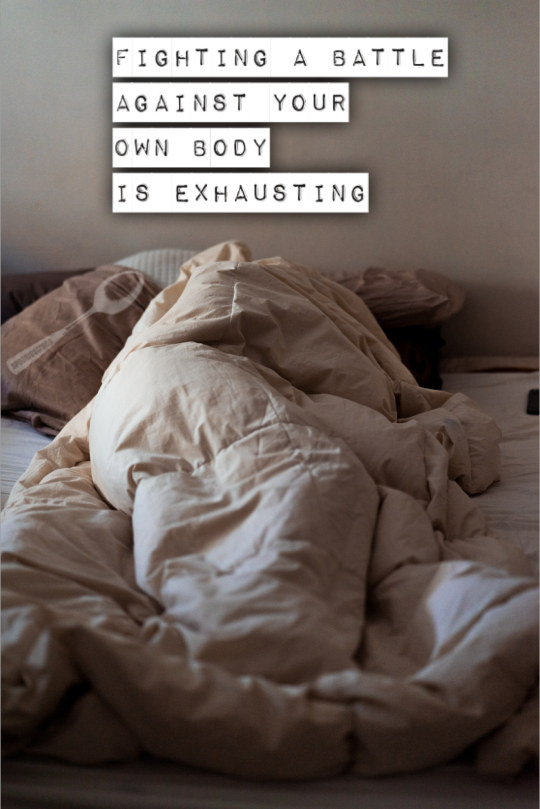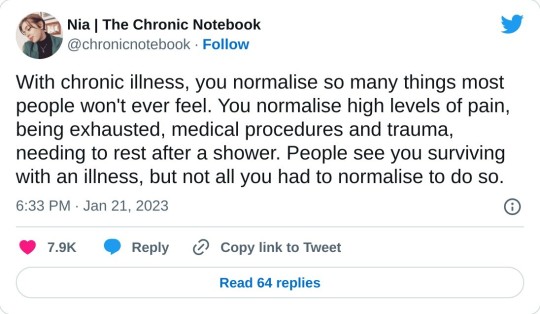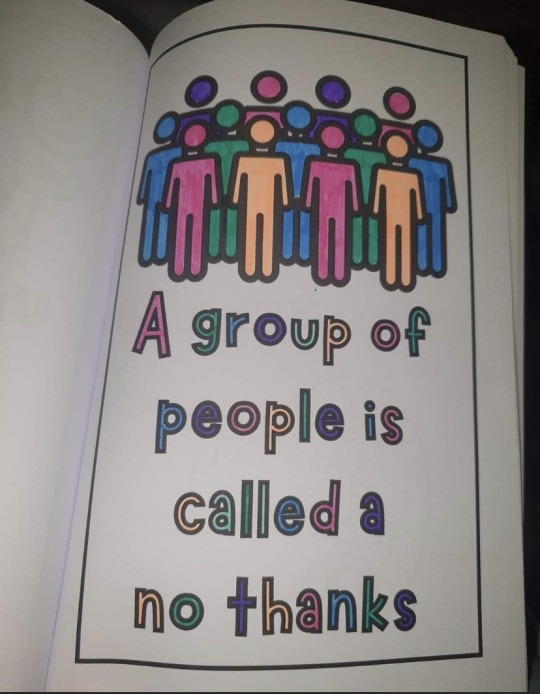Don't wanna be here? Send us removal request.
Text
Something I don't see talked about a ton in the chronic pain community is how physical pain stresses out the body and mind. It's harder to think when in pain (brain fog), and because your body is under a lot of stress, it can lower the threshold for other stressors.
I know that if I'm in pain, I can't handle as much stimulation or mental/emotional stress. It's a lot easier for me to break down crying on my high pain days—not just bc I'm in pain but because it's harder for me to process things emotionally while my body is under stress from pain. For the same reason, it can be difficult to think as quickly or clearly. I can even have a hard time speaking.
I feel a lot of pressure from society to push through the pain. To keep going despite how hard it is to think or to process the world or my feelings while I'm in pain. Today, when I was in lots of pain, my friend told me to relax, to take it easy. And it was really, really hard. I needed so much reassurance that I didn't need to keep pushing. That everything would still be okay if I stopped treading water and just floated instead.
I'm not totally sure what my point here is, if there is any. But I think we need to be especially kind to ourselves on high pain days. And we need to let ourselves know when it's time to rest, even if it's the last thing we want to do.
4K notes
·
View notes
Text

fighting a battle
against your own body
is exhausting
359 notes
·
View notes
Text
💯
"Have you tried..."
Have you tried shutting the fuck up, because that would actually be helpful.
651 notes
·
View notes
Text
There’s one thing I always think of when I hear “how could you let it get so bad?” and similar phrases. It’s in the comments of every video of matted hair or a dirty kitchen.
I think the appropriate response is “what would have to happen to you for you to let it get that bad?” And when you think about that question, and the horrifying answers that come with it, you almost certainly have more sympathy for the person you were being judgemental to.
48K notes
·
View notes
Text
When I look at the clock and it’s only 10 AM and it’s way too long until I can go to sleep...

50 notes
·
View notes
Text
Normal people’s reaction when I talk about my life...

80 notes
·
View notes
Text
To the folk whose diagnoses came as a relief
To the folk whose illnesses didn’t improve
To the folk whose illnesses deteriorated
To the folk who no longer have hope for their health
I see you
This is really, really hard
The world is still a better place because you are here.
1K notes
·
View notes
Text
The young woman was catatonic, stuck at the nurses’ station — unmoving, unblinking and unknowing of where or who she was. Her name was April Burrell. Before she became a patient, April had been an outgoing, straight-A student majoring in accounting at the University of Maryland Eastern Shore. But after a traumatic event when she was 21, April suddenly developed psychosis and became lost in a constant state of visual and auditory hallucinations. The former high school valedictorian could no longer communicate, bathe or take care of herself. April was diagnosed with a severe form of schizophrenia, an often devastating mental illness that affects approximately 1 percent of the global population and can drastically impair how patients behave and perceive reality. “She was the first person I ever saw as a patient,” said Sander Markx, director of precision psychiatry at Columbia University, who was still a medical student in 2000 when he first encountered April. “She is, to this day, the sickest patient I’ve ever seen.” It would be nearly two decades before their paths crossed again. But in 2018, another chance encounter led to several medical discoveries reminiscent of a scene from “Awakenings,” the famous book and movie inspired by the awakening of catatonic patients treated by the late neurologist and writer Oliver Sacks. Markx and his colleagues discovered that although April’s illness was clinically indistinguishable from schizophrenia, she also had lupus, an underlying and treatable autoimmune condition that was attacking her brain. After months of targeted treatments — and more than two decades trapped in her mind — April woke up. The awakening of April — and the successful treatment of other peoplewith similar conditions — now stand to transform care for some of psychiatry’s sickest patients, many of whom are languishing in mental institutions. Researchers working with the New York state mental health-care system have identified about 200 patients with autoimmune diseases, some institutionalized for years, who may be helped by the discovery. And scientists around the world, including Germany and Britain, are conducting similar research, finding that underlying autoimmune and inflammatory processes may be more common in patients with a variety of psychiatric syndromes than previously believed. Although the current research probably will help only a small subset of patients,the impact of the work is already beginning to reshape the practice of psychiatry and the way many cases of mental illness are diagnosed and treated. “These are the forgotten souls,” said Markx. “We’re not just improving the lives of these people, but we’re bringing them back from a place that I didn’t think they could come back from.”
– A catatonic woman awakened after 20 years. Her story may change psychiatry.
3K notes
·
View notes








